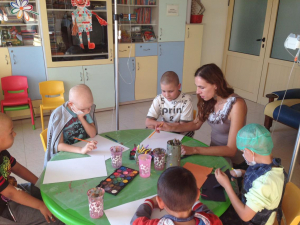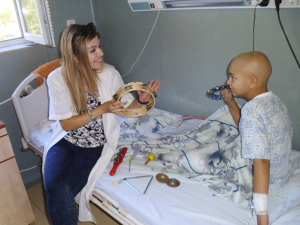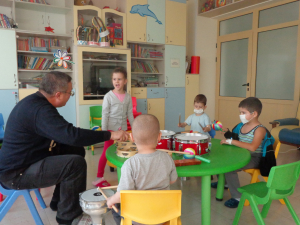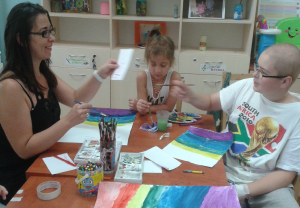
ARTON PROGRAM - The therapeutic power of the group
Creative projects involving group work - general musical performance or group painting, collage, sculpture - are useful in helping to explore and strengthen social...
Establishing respect for emotion is the most important childrearing task you have as a parent. If you and your partner treat each other and the kids with emotional awareness and empathy, your children are much more likely to enjoy strong mental health, stable, satisfying relationships, and a rewarding work life. Here are a few fundamental parenting practices that will help build your child’s emotional intelligence (EQ):
Remember that you can’t convey what you don’t exemplify. Your children learn from you— through your actions, much more than your words. If you can’t communicate your emotions through your behavior, they won’t respect their own emotions.
Try to learn from your children. Children haven’t unlearned EQ as you may have. They make friends easily and retain their capacity for joy because they’re naturally empathic and instinctively ready to feel their emotions fully and then let them go. So, listen and learn; you’ll raise your own EQ and establish flexibility and mutual respect into the family.
Be on the lookout for repeating history. It’s a lot easier to instill fear of feelings in children than you think, even if you try hard not to. Write a list of things your parent told you as a child—you might even jot them on a piece of paper and put it in your wallet as a way of symbolically keeping them in your memory. When you’re tired and irritable, pull out that list and notice your own feelings as you read it. This reminder should keep you from shrugging off the warning feelings that arise when you start to utter these refrains yourself. Also, whenever you get a physical signal that you’re dismissing your child’s feelings, do what you can to observe your tone of voice, facial expressions, and body language—run to a mirror if you can. If what you find hurts you, it’s also hurting your child. Periodically recall how you felt being the object of those words and expressions. Invoking those painful experiences is a strong discouragement to repeating history.
Remember that unhappy parents raise unhappy children. If you’re exhausted and depressed by the demands of parenthood, your children will be depressed, too. You can’t sacrifice yourself and do anyone else any good, so keep yourself healthy if you hope to raise healthy children.
Be quick to apologize when you make mistakes. Let’s be realistic; you will let your guard down from time to time—we all do. Fortunately, you have a simple tool for ensuring that your errors don’t do permanent damage. It’s called an apology, and it comes in pretty handy throughout parenthood.
No one can reduce the complexities of raising children, each one unique, to a list of simple rules. Through emotional awareness and empathy, you’ll find the correct things to say and do with your child at any given moment. That said, there are situations that arise in virtually every childhood, from infancy to puberty, that challenge parents’ ability to acknowledge the worthiness of children’s feelings, without being manipulated by them. And there are ways to incorporate emotional intelligence into your responses to these situations.
The following are a few examples of how you can apply high-EQ approaches to the unique challenges that arise in your own parenting adventures.
Fear of the dark. Here’s a typical power play that leaves EQ-challenged adults feeling manipulated, guilty, and just plain pooped. Has your child managed to secure a permanent spot in your bed because you can’t stand to hear them cry, you remember how afraid you were of the dark at their age, or you’re just plain tired of resisting? Assuming you don’t want them in your bed at night, your high-EQ alternatives are to empathize (not sympathize) with the child’s fear, and problem-solve together to come up with a solution that will suit you both: A night light? A change of room? Moving the child’s bed to a part of the room that feels safer or is naturally brighter? How about a schedule that reduces the time spent in your bed night by night? When your urge to protect is overwhelming, try assuming the child can handle his own feelings.
Bossiness. When your sweet child starts acting up as so many children do at some point, the low-EQ response is to tell them they’re doing something wrong. Because no matter what words you use, they won’t hear you. The high-EQ way is to let them make their own mistakes and learn from them. If that doesn’t feel active enough to you, you can also try saying something like “I don’t like it when someone talks to me that way.” Also watch for times to engage her empathy when someone else is being bossy and ask, “How do you think that makes the other kid feel?”
Temper tantrums. You might know this one, because it’s been in every parenting manual: Ignore these episodes completely. That’s a high-EQ response because it sends the message that you refuse to be manipulated by your child’s upset. Children who get a response when they throw a tantrum learn unhealthy emotional habits that will only harm their relationships as they grow up.
Greed. Sometimes kids seem to want everything they see, including things they don’t need and won’t use. Tell them that greed is sinful and shameful, and they’ll feel ashamed—and you’ll never know what emptiness they were trying to fill from it. The high-EQ response comes from discovering what each person’s unique needs are. Ask yourselves, “are we loving this child the way the child needs to be loved?”
Staring. We’re usually in such a hurry to stop this behavior before it offends the person being stared at, that we confuse children about their own feelings. Don’t hustle them off, distract them, or chastise them. Instead, acknowledge their natural fascination with those who are different from the children by saying something like “I know, that bothers me, too. What must it feel like to have to live on the street (or be in a wheelchair, or have scars like hat, etc.?” Then help your children understand that when our empathy is evoked, we act on it: “This is what we can do to help…”
Childhood myths. People who are ruled by their own needs regarding these fantasies always end up going to extremes, being brutally matter-of-fact about the Tooth Fairy and Santa Claus, or going to great lengths to encourage these myths. The child’s needs should always rule here. Fantasy has to do with hope, and if a myth seems emotionally important to the child’s outlook, you don’t have to burst the child’s bubble in the name of honesty. You don’t have to lie either; by conveying the idea that belief and faith are personal qualities, you let the child decide themselves when to let go.
Adolescence creates difficulties for many families, because no one knows exactly how to approach the enormous changes that teenagers are going through. Children naturally pull away from you as they pass into adulthood, but you’ll be eager to see that they get there safe and whole if you disconnect from your emotions. You’ll need all your empathy to remain understanding when hormonal upheaval turns your adorable kids into unpredictable, irritable rebels. It also takes sharp active awareness to remain the source of security and wisdom that your teenagers will need more than ever before.
You can maintain a sense of balance even when adolescence seems to turn your world upside down, as long as you’ve cemented your emotional connection with your children throughout their younger years. Mutual respect, loving acceptance of the inevitable changes that families undergo, and a constant sense of humor will go a long way toward preventing harmful splits. Here are a few high-EQ tips:
Find someone who will agree to let you call and emote for four or five minutes when you feel frazzled by parenting. Because you don’t want advice, but just want to be heard, an acquaintance may be the best choice, but a friend or family member who can avoid interfering is also fine. Not everyone is willing and able to do this, but those who are might appreciate your offer to do the same for them in exchange.
When you make a call, it’s OK if you run out of steam before four or five minutes are up. Just keep expressing your feelings without interruption until you feel satiated.
You can’t hope to get close again if just being near each other sets off sparks. Relax deeply and focus on the intense feelings that flare up repeatedly with your teenagers. Allow the feelings to intensify as you ask yourself whether these are old feelings and what their nature is—anger, hurt, shame, fear? Most hot buttons exist thanks to emotional memories, so this exercise can tell you whether the flare-ups are caused by your teenager’s behavior or some old memory. If it’s any of these, you should now be able to control yourself better with your child.
Before you decide to ask your teenager to change some behavior that bothers you, analyze your child’s body language and their facial expressions so that you fully understand the child’s mood, and imagine the child’s emotional response to your request. If you image the child becoming upset, think about what the child finds threatening, embarrassing, or difficult about the subject? In other words, how does the child feel, and how does this explain the child’s bothersome behavior? The empathic insight you gain from this exercise greatly improves your chances of getting through to your teenager.
Directly stating your interest in knowing what your teen needs is another way to use empathy to bring you back together. Whether you’re focusing on a specific issue or your entire relationship, you can negotiate with your child in a mutually loving and respectful way by having each of you make a list of three to five things you need from each other. Then make a list of the things you each think the other needs from you. Exchange lists, compare, and determine what each of you is willing to, given what exchanges you might make.
Adapted from Raising Your Emotional Intelligence: A Hands-on Program for Harnessing the Power of Your Instincts and Emotions, by Jeanne Segal, Ph.D.

Creative projects involving group work - general musical performance or group painting, collage, sculpture - are useful in helping to explore and strengthen social...

In the ARTON Program our team of oncopsychologists, art therapists and music therapists develops the process of children's creativity as a process of...

In ARTON sessions, creating a piece of music or a song is an emotional experience of coping and satisfaction for the participating children. They make friends with...

Painting provides patients with a spontaneous, plastic method of depicting thoughts and experiences. Painting with paints is not as structured as with pencil or...










